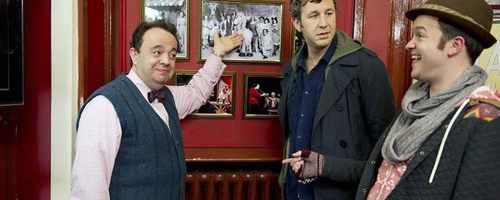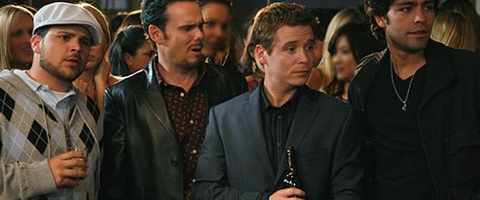‘Family Tree’: Quietly Breaking All of the Rules
My mom asked me an interesting question the other day. She had just come back from This is the End and, after admitting that it was “ok”, she asked, “Why is your generation’s sense of humor so raunchy?” My immediate reaction was one of protest as I rattled off a list of reasons:
1. Because it can be. Censorship has eroded so much that virtually nothing can stop an R-rated film from saying or doing whatever it pleases. New doors for comedy have opened.
2. Because it must be. Maybe the gross-out genre is the only kind of contemporary comedy that still feels remotely fresh, new, and exciting. Too many doors for comedy have closed.
3. Because it’s ours. Mine is the generation that saw Knocked Up and Superbad in the transition to college as a coming-of-age experience, both liberating and exhilarating.
So yes, I still get a kick out of the foul-mouthed, pot-smoking, no borders mentality of the Seth Rogen crew, and I had an absolute blast during This is the End. But still my mom’s question lingered in my mind.
Determined to prove her wrong, to prove that not all current adult comedies rely on sex, drugs, and four-letter words for laughs, I introduce Family Tree! Perhaps you’ve seen it advertised on HBO GO on your way to something sexier (True Blood perhaps, or Game of Thrones). Chances are you’ve ignored it entirely or it’s gathering up digital dust on your DVR. That’s because this quiet little oddball of a series rarely raises its voice and never draws attention to itself. Yet it may be the most delightful comedy on television.

While you weren’t looking, Family Tree wrapped up a brilliant first season on Sunday night, an 8-episode run that aired both on HBO and the British channel BBC Two. Co-produced by HBO and the BBC, Tree earned positive reviews but dismal ratings, even by premium cable standards. The show averaged about half a million U.S. viewers per episode, less than half the average of HBO’s political satire Veep.
Tree’s story itself is a radical departure for HBO. After inheriting a box of photographs, artifacts, and mementos from his late great-aunt, Tom Chadwick (Chris O’Dowd) sets out to trace his heritage and uncover his family’s history. Reeling from a sort of identity crisis after losing his job and his girlfriend, Tom hopes that the journey will restore his sense of self and give him a sense of direction.
HBO comedies have often been about family, but never the literal kind. The network has built its reputation on tightly-knit groups of friends, surrogate families bound by the joys and struggles of urban living, conspicuous consumerism, and highly active sex lives. With Entourage for the guys and Sex and the City for the ladies, the network painted a picture of family vastly different from your typical nuclear unit.

Along with its array of “industry” series (The Larry Sanders Show, Curb Your Enthusiasm, Entourage, BBC’s Extras), HBO prides itself on offering what other networks cannot (read: more sex, more drugs, and more language). Thus, we have Veep, a political comedy that lets the VPotUS (Julia Lois-Dreyfus) use insults like “varicose dick vein” and Girls, in which Lena Dunham talks about masturbating 8-16 times a night…to her parents…over dinner. Now don’t get me wrong. I like these shows.
But I like Family Tree more, especially because it just doesn’t seem to fit. Like Lena Dunham’s Girls and Larry David’s Curb, Tree is the product of a sort of television auteur (Christopher Guest co-writes and directs every episode) and like Curb, the show’s dialogue is mostly improvised by the actors. But the similarities end there.
I can’t remember an HBO comedy that uses its free pass for sex, nudity, and cursing so sparingly…or so wisely, let alone one that could actually be described as “sweet”. Family Tree is about going beyond your comfort zone, finding common ground in the most unexpected of places, and risking everything to make a genuine connection. It’s a glorious anomaly.

As an adult show on a premium network, Tree isn’t entirely lacking in vulgarity and crudeness. TV is a business, after all, and HBO feels obligated to remind its subscribers why they’re paying extra. But it never feels gratuitous or unnecessary. Characters curse, but a less-is-more strategy makes it far more uproarious and satisfying when they do, and the rare occasions of sex and nudity are handled with surprising tact. This is largely thanks to Guest, who understands that the more you withhold these luxuries, the more impact they will have when they surface.
Long before we were ever introduced to the folks at Dunder Mifflin, Christopher Guest pioneered the “mockumentary” genre. With comedy classics like This is Spinal Tap, Waiting for Guffman, and Best in Show, he perfected a unique formula all his own. His imagination seems to hold a bottomless well of eccentric characters with off-the-wall quirks that are just plausible enough to accept at face value. No matter how odd these idiosyncrasies may get (and trust me, they get pretty odd), Guest never condescends or judges them. In fact, he seems to have genuine affection for his creations and the effect is contagious.
Guest’s regular stable of actors is well represented here (Michael McKean, Ed Begley Jr., Bob Balaban, and of course Fred Willard), but the main performers are the real treat. Nina Conti is a revelation as Tom’s sister Bea, who expresses herself via a monkey hand puppet named Monk. Conti developed this ventriloquist act as a comedian in England before the duo appeared in Guest’s For Your Consideration. But here, given the chance to construct Monk as a defense mechanism, a crutch, a liability, and a subversive wit (here’s where most of the cursing happens), Conti shines, oscillating from Bea to Monk to something thrillingly in between with marvelous ease and dexterity.
Equally remarkable is O’Dowd himself, the 6′ 3″ Irish actor who headlined the British sitcom The IT Crowd and wooed Kristen Wiig in Bridesmaids. Unlike his character on Girls, the venture capitalist who Jessa impulsively marries and breaks up with, he’s insanely likable as Tom Chadwick. He’s warm, optimistic, and never cynical, but with an unmistakable sadness under the surface. He embraces every family revelation with enthusiasm and approval, proclaiming, “I’ve always had a military heir about me” or “I’ve always felt Indian”, reinventing himself with every new ancestral tidbit that comes his way. His willingness to live in the tradition of his ancestors, however, reveals his own disintegrated sense of self. He doesn’t really know who he is or what he wants.
But the box of curios is a clever premise, one that allows for endless narrative possibilities. Tom’s already been all over England and spent half of the season in California, but his search can take him virtually anywhere on the map. With the brains of Christopher Guest and co-creator/writer Jim Piddock behind him, Tom can encounter pretty much anyone. We’ve met an incredible number of relatives (Guest’s Dave Chadwick, who claims to have a “vestigial tail”), friends (Pete Stuppels the “Zoological Cage Management Associate”, aka a “shit shoveler”), and blind dates (including a girl who thinks bones are “quite sexy”), but the series belongs to Tom Chadwick.
In one season, he’s transformed from a “sheltered Irish twig” to a veritable world-traveler and historian, but we still wonder: is his genealogical obsession the solution to his problems or a distraction from them, or are the two inevitably intertwined? Blind dates and job interviews reveal a man coping with significant pain, confusion, and uncertainty, perhaps turning to the past because the present seems to have abandoned him. A stunner of a season finale suggests that Tom has started to grow as a person. He’s faced many of his fears (cats ganging up and scraping his eyes out, for instance) and taken many a risk, but is he ready to fall in love again? Is he ready to move forward?
In what may be the best episode to date, Tom discovers that his great-great-grandfather Charles Chadwick had both a Union and a Confederate uniform during the Civil War. After speculating that he was a traitor, Tom learns that Charles actually went behind enemy lines for the woman he loved. He was “not a coward,” Tom claims, “but a big ol’ romantic and brave as a boot”.
It will take a burst of fan activity and, God willing, a Season Two, to see if Tom is cut from the same cloth.
What do you think? Leave a comment.











Very cool analysis of a series I have never seen. I will definitely check it out.
Oh! And I completely agree with your sentiment about This is the End. It’s such a great boil-down of this generation’s humor. That said, I enjoyed the raunch.
This is kinda like a mockumentary of the popular genealogy shows. Highly recommened!
/J
I don’t know why a Christopher Guest on HBO wasn’t as big of a pull as it might’ve been in an alternate universe.
I really, really loved this show. I hope empathy makes a comeback in comedy if the end result is stuff like this.
Great article. I do think you’re on to something when you highlight how “raunchy” comedies are these days. However, I also think the idea of “raunchy” changes and the more we’re exposed to something that is so-called raunchy, the less raunchy it seems to us over time, and so comedians have to keep pushing the envelope to create something that feels raunchy again.
Which implies that raunchiness is mainly a generational or multi-generational fad that shall eventually shrivel away as people either lose interest, the only limits increasingly become clearly morally objectionable to the layman or both. I am seeing signs of this now (and indeed this is simply a continuation of the more vulgar trends of the Boomers and Gen-X-ers).
It started off very slow… but, it’s definitely blossomed. I think it’s good sometimes allowing a character to “simmer” a bit in the beginning because it deepens the audiences emotional investment. I’m invested now! BTW, the sister and puppet are great fun.
I think Family Tree comes very close to being great, but never quite gets there, despite the best intentions. I appreciate that it is toned down, although I think you do give it more credit than it deserves (it did use the c-word from memory, and I don’t think you can call any show that does that ‘sweet’.)
After watching the show, I think its charming moments outweigh the obscene ones. I would describe it as “sweet” because of the tender, intimate nature to the familial relationships explored in the show. Despite the opportunities to judge the many faults of its many characters (i.e. talking monkey, awkward best friend, literally crazy relatives), the show focuses on accepting and loving of all types of individuals. I never felt that any of the characters, crazy as they all are, were portrayed in a condescending light (although it would have been very easy to do so). I thought it was all very sweet and somewhat inspirational.
In this case, I would argue that one bad apple doesn’t spoil the whole bushel.
Despite its occasional indulgence in crass dialogue (usually uttered by Monk), I agree that the show achieves a kind of sweetness through its tender vibe and loving relationships. I think the c-word scene comes purely from a place of character and isn’t just an excuse to mouth off. If anything, I think the scene endears Bea to the audience by revealing her underlying sadness and bottled up insecurities. In my opinion, her need to insult people with vulgar, over-the-line comments through her monkey puppet don’t feel like cheap gags, but intricately developed character quirks (and weaknesses).